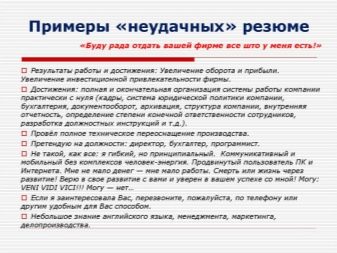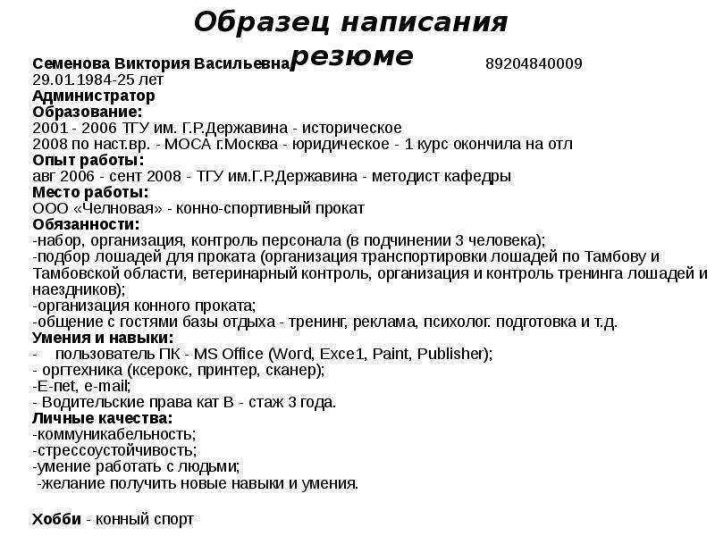I can't find a job: what is the reason and what to do?

Long-term absence from work can negatively affect not only your financial situation, but also your emotional state. In this regard, the solution of this issue should be approached with all seriousness and responsibility.
What are the most common reasons for job rejection? How do you fix these shortcomings and prepare for the interview? What shouldn't you do? You will find the answers to these questions in our article.

Reasons for failure
Many people complain that they cannot find a job. Long-term unemployment often causes emotional breakdowns, neuroses and depression. At the same time, job seekers often blame employers for their failures, and this approach is far from always correct. First of all, you need to pay attention to yourself.
- Bad resume. Despite the fact that a resume is a document that gives an employer a first impression of a job seeker, many do not take it seriously. Most often, you can encounter such errors as incomplete filling of all the necessary columns (for example, you did not indicate your education or work experience), a large number of language errors (missing commas, misspelled words and expressions), the use of template constructions, etc. If you have been unable to get a job in your specialty for a long time and you are refused everywhere, then this is a reason to study your resume or write a new one.
- Lack of qualifications and experience. Many employers in the job description indicate the specific requirements that the applicant for the position must meet. Often this description is read only in passing.In connection with such irresponsibility, situations arise when a person chooses a vacancy that does not at all correspond to his skills. So, if the ad explicitly states that the applicant must have a specialized education and work experience in the specialty, then you should not apply for the position if you do not fall under this category of specialists (even if this is your dream job).
- Inappropriate requirements. Perhaps you are making too high demands on your work. Make a judicious assessment of your professional level, the quality of the education you have received, and your skills. Perhaps you are trying to get positions that are not yet available to you, or you are applying for too high wages, and even with a free work schedule.
- Low activity... In order to find a job, you need to look for it. At the same time, it is not enough to view the message boards once a week. With regard to your employment, you should take a rather active position: daily look through the ads in newspapers, as well as on the websites of the employment center in your area, communicate with friends and acquaintances (perhaps they know about the opened vacancy). In general, you must take this situation into your own hands and completely control it.
- Inability to behave correctly in interviews... Often there is such a situation when the employer is completely satisfied with your qualifications and your competencies. At the same time, your resume is drawn up competently and accurately, the document makes a positive impression on the personnel of the personnel department. In this case, the second stage of employment for the position is the interview. If you do not prepare for interviews, and also behave incorrectly at such business meetings, then this is one of the reasons why you may be denied the position.
- Unfavorable situation in the labor market... Sometimes you should not blame yourself exclusively for the lack of work and try to look for certain flaws in your person. Often, an unfavorable situation develops in connection with the economic crisis, unfavorable labor market conditions and low demand for specialists in your area of expertise.


As you know, the first step towards solving a problem is understanding its causes. That is why, before trying to fix a situation, it is important to understand why it has arisen. Conduct a thorough analysis and then proceed to the decision procedure.
How to solve the problem?
Once you've identified one or more reasons why you can't find a job, it's important to start addressing the issue. There are several proven methods that we will discuss today.
Search and selection of vacancies
First of all, it is important to approach the search and selection of vacancies with all responsibility. The first thing you should do in this regard is identify your key skills and professional capabilities. So, if you have a law degree, then it makes sense to look for a job in this particular area. If you did not receive a higher education, then try turning your attention to less qualified positions, for example, a secretary or a waiter.
An important point is regular review of job boards with vacancies. Try to submit your resume as soon as you see that one or another specialist is required. In addition, it is not necessary to limit yourself to communicating with the employer on the Internet - you can call the company or even visit the HR department yourself.
As mentioned above, be sure to tell your friends that you are looking for a job. Perhaps they or someone they know knows of an open position that fits your profile.
If your dream is to work in a specific organization, then write or call the company directly. It may be that their website does not list any open positions. However, keep in mind that not all sites on the Internet are regularly updated.In addition, if you have sufficient motivation and skills, you can ask the company for an internship with further employment. Most employers value strong, determined and persistent employees.

Preparing for the interview
If the employer has invited you for an interview, then you can be sure that he is interested in your candidacy. However, the invitation itself is of little value, as the way you conduct yourself in the work interview is of particular importance. In this regard, very it is important to carefully prepare for your interview.
So, first of all you need to carefully study your resume and prepare for answers to tricky questions... For example, an employer might ask why you left your previous job or why there is a gap in your career.
After that it is important to study the company itself. Learn about the history of the company, with its specialization and leadership. Thus, in the eyes of the employer, you will appear as an interested and responsible job seeker. In addition, during the interview, you will be able to ask questions that interest you.
In order not to get nervous during the interview, rehearse your speech several times on your own at home. You can do this in front of a mirror or ask friends and family for help.
Don't forget to consider your appearance. Remember that it is best to come to an interview in business attire (for example, a suit or pants and shirt). Never wear sportswear or sneakers. Women should consider their hair styling in advance, while it is undesirable for them to be loose.

Writing a resume and cover letter
Analyze your previously written resume and cover letters, find errors and shortcomings. If necessary, rewrite the documents again. Remember that these documents create the first impression of you in the eyes of the employer. That is why they must be drawn up according to certain rules and principles.
When writing your resume and cover letter, you should use a formal, business-like style of speech. Include sections such as: "F. Name and contact information "," Work experience "," Education "," Personal qualities "," Professional skills "," Hobbies and hobbies "," Position of interest ".
Remember that the documents themselves should be short and concise, without unnecessary biographical details.

What shouldn't you do?
In order for the search for a job to be marked with success, some actions should be avoided.
- So, first of all, you should not lie to the employer. Do not under any circumstances indicate false information in your resume or cover letter, and do not lie in interviews. Quite often, job seekers try to show themselves as ideal applicants for the position, and therefore try to embellish their professional skills and abilities. It is strongly discouraged to do this, since your lies will be revealed in the process of work, and you will lose not only your job, but also your personal reputation.
- Another common mistake is being overly intrusive. So, many candidates, seeking to get a job as soon as possible, call and write to the employer several times a day, constantly come to the office. This behavior will negatively affect the perception of you as a professional. Plus you will look desperate.
- Failure to comply with business etiquette. Remember that communication with an employer is business communication. That is why all the rules of business etiquette should be observed over the phone, in correspondence and at an interview. In no case do not contact the employer "you" and do not retell to him unnecessary details of your personal life.

Thus, using all the tips we have proposed and avoiding popular mistakes, you can get out of unemployment and finally get your dream job.








